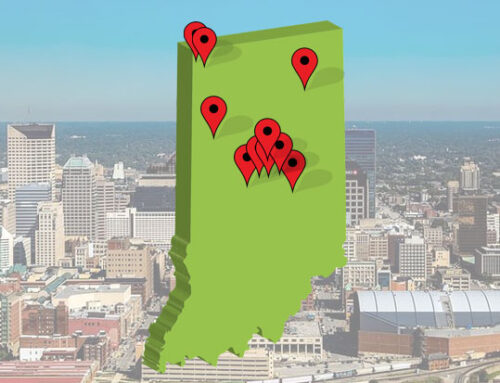Have you or a family member recently been injured due to the negligence of someone else? If so, you’ve probably realized even facing daily life can be a struggle because of all the added stress that comes with getting medical treatment and the insurance companies pressuring you to settle quickly. Against the backdrop of dealing with pain, working with physicians, and receiving medical treatment, the prospect of filing a lawsuit can be overwhelming. In an effort to reduce some of the anxiety and dispel some of the mystery, we are going talk about the process of finding a lawyer and having your initial meeting.
Finding and hiring a personal injury lawyer is the most important step in the process of recovering from your injuries. It can also be one of the most overwhelming. There are plenty of resources available, including websites like Super Lawyers, Best Lawyers in America, and Avvo, a multitude of commercials and billboards, and formal referral programs (in central Indiana, one of the best is the Indiana Trial Lawyers Association). Perhaps the most important thing to keep in mind when looking for an attorney is that comfort matters. This is a person with whom you are going to be working very closely over the coming months or years, so it is important to find an attorney with whom you are comfortable and trust, but who also has the experience necessary to get the best results possible for you.
Keep in mind that statutes of limitations exist. For most personal injury actions in Indiana, you only have two years from the time of the accident to bring a lawsuit. A more pressing time limit, though, is the decaying of witness memories, loss of important documents and records, and need to record physical and medical condition, so time is of the essence. An experienced personal injury attorney will be able to guide you through this process. However, you shouldn’t take that to mean that you absolutely must hire the first attorney with whom you make contact. Evaluate whether you believe the attorney is a good fit based on your interaction with them at your initial meeting. But how can you prepare for that meeting?
There are three broad components of the initial meeting: preparation, case evaluation, and fee discussion. The first step in having a successful initial meeting (often called a case consultation) is to prepare. Be sure to gather, organize, and bring any and all documentation you have. If you were in a car accident, try to obtain a copy of the accident report. Bring any documentation—including bills—from your physician. The more documentation and evidence you can bring to the meeting, the better the attorney will be able to evaluate your case. Preparation for the initial appointment should begin as soon after you sustain your injury as possible. One very helpful thing to do: keep a journal of your physical condition and treatment. Document how you feel—what hurts, what limitations you have, etc.—every day, and be sure to date it. A journal like this will help your attorney get a sense of your possible damages (discussed in a later post), and it will help protect you against a defendant claiming that you are simply making up your symptoms to increase those damages.
The second component of the initial appointment is the case evaluation. Do not be caught off guard if your attorney asks very pointed, and often very personal questions. The attorney will need to probe your injuries and your experience both before and after your injury in order to get a better understanding of your case. The worst thing you can do for yourself during this process is to be anything other than completely honest. Nothing you share with the attorney can be repeated, so do not hesitate to tell the truth.
While your attorney is reviewing your documents and talking with you about your case as a means to determine how strong your legal position is, you should be talking with the attorney about any questions or concerns you have with his or her representation of you. This is the time for you to flesh out whether you are comfortable with the attorney. Some valuable questions to ask are: How long have you been practicing law? What kind of cases do you usually handle? Have you represented any clients similar to me? Have you had any cases similar to mine? How much access will I have to you during the pendency of my case? What percentage of your practice is devoted to personal injury?
Those last three are particularly useful. Many attorneys practice a wide variety of law, meaning they do not dedicate themselves exclusively or even mostly to personal injury. It is important to make sure the attorney you hire has the resources necessary to pursue your case to the fullest possible extent. Moreover, not all personal injury cases are created equal. An attorney who holds him or herself out as a personal injury attorney may not be familiar with your specific kind of case. A trucking accident is different from a railroad accident which is different from a slip and fall. It is important to try to find an attorney who has experience handling your kind of accident and your kind of injury. Lastly, it is important to know whether your attorney will be responsive to requests for case updates and other questions you may have. Some attorneys refer client questions to a dedicated client manager, while others provide direct access to their clients. What you prefer is up to you, but it is important to know for certain what you are signing up for.
If you and your attorney mutually decide to move forward with representation, the final component of the meeting is a discussion about fees. The vast majority of personal injury attorneys take cases on what’s called a contingency fee basis. A contingency fee means you don’t pay any attorney fees out of pocket. Instead, the attorney takes a percentage of what they recover. These fees generally range anywhere between 33-40%. It is not uncommon for attorneys to take a smaller percentage if the case settles before a lot of legal work is done, a higher percentage if discovery has begun in earnest, and an even higher percentage if the case goes to trial. Just a side note, our law firm’s fees never change, we always charge 33%, even if the case has to proceed to trial. If the contingency fee is much higher or lower than 33% you would be well served to ask why. Too high could indicate price gouging; too low could indicate a lack of experience.
If you decide the fee arrangement is appropriate and you are comfortable with the attorney, the only remaining step is to sign the representation agreement. Make sure the agreement clearly states the fee arrangement as you understand it, fully explains the costs, and includes provisions for settling up if you decide to fire the attorney and seek new representation.





